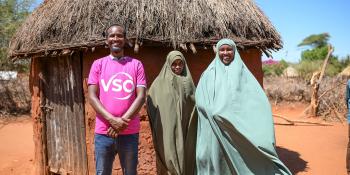Around the world, tourism is on the rise, but local people often don’t see the benefit, writes Deborah Torr. Our work in Zanzibar is an example of how simple changes can make a world of difference to local farmers trying to earn a living.
Spotless beaches, crystal clear water and beautiful historic architecture – there’s no doubt that Zanzibar, off the coast of Tanzania, is a holidaymaker’s dream.
In 2016, over 350,000 visitors were recorded here – representing year-on-year growth of 28%. Upscale hotels and restaurants have sprung up ready to receive these relatively wealthy tourists (almost half from just five countries: Italy, Germany, the UK, US and South Africa) with open arms.
Chris Takyuka, 35, a volunteer from Uganda, has spent the last four years as a marketing and value chain adviser for VSO’s Commercial Agriculture for Smallholder Farmers in Horticulture (CASH) project. Chris has seen the impact of tourism on Zanzibar.
“The tourism industry here is growing – investors are building new hotels right now – but locals need support to help them tap the potential the tourist industry offers.
“It is very common for poor small holder farmers to miss out on the economic opportunities from tourism.”
Luxury and poverty
Despite the rich fertile land and agricultural traditions, Zanzibar’s world-class hotels and restaurants have, in the past, imported the majority of food from the mainland.
Typically, farmers end up without the knowledge, resources and routes to market needed to sell to the hotels and restaurants. They are unable to compete with the quality and quantity of produce that outside importers can offer. That’s where VSO comes in.
Since 2012, volunteers like Chris Takyuka have been changing the lives of farmers in Zanzibar. Volunteers trained farmers in good farming practices, how to manage their crops, post-harvest, and business and marketing skills.
Farmers have been taught how to build cool chambers from local materials like bricks and charcoal, which helps to preserve crops until they are ready to sell. Volunteers have also supported farmers in forming a farmers union, so farmers are able to advocate for their rights and engage the government and private sector to agree to trade terms.
Seeds of change
Samuel Nyanda, 38, was taught business and agricultural skills through the CASH project.
“Now I can farm in a modern way. Being part of this project has changed everything in how I operate,” says Samuel.
“I want to diversify – to try new vegetables, to rear chickens and sell eggs. I used to be a traditional man, but now I am a man of change.”
Samuel has invested profits back into the farm, and is now able to irrigate his crops more effectively.
On Pemba, an island north of Zanzibar, Khamis Salim Hamad used to have a fourteen-hour round-trip on the back of a cow and cart to deliver his tomatoes to market.
The CASH project gave him advice on production storage and marketing, and helped him join a group of farmers who share ideas and support each other.
With the extra profits he is now earning he has bought a truck. It now takes him just one hour to get to market.
I used to be a traditional man, but now I am a man of changeSamuel NyandaCASH project farmer
Khamis believes in the power of working as a group to pool their resources to improve their prospects.
In the coming years, Khamis and his fellow farmers are planning to expand even more.
They want to buy a greenhouse to protect the tomatoes from rain and a solar-powered pump for irrigation.
Standing out in their field
The agricultural industry in Zanzibar uses a grading system to show the quality of produce, with grade A the best classification, indicating an item has no infection, damage, or physical imperfections.
In 2012, when the project started, none of the farmers could claim their produce was at a grade A, but now 76% of fruit and vegetables grown by these farmers meet the grade A criteria.
In the same amount of time, these smallholders increased the volume of crops grown by 66% thanks to training from VSO.
It’s not just Samuel and Khamis who have benefited from this project – these figures come from the 10,900 farmers who benefited from the CASH project.
Chris Takyuka has high hopes for the farmers on the CASH project. “My hopes and dreams for these farmers is to make even greater progress, and mobilise more farmers to form groups and join their farmers union. I am really proud of all that they have achieved so far.”
Read more

The two volunteers empowering girls and young women in Mozambique
Nelma and Carmirene and are two volunteers working on VSO's EAGLE project in Mozambique. For Nelma and Carmirene, education is not just about school, it is about meeting people where they are and using the right tools to challenging harmful norms. Here are their stories.

A ripple of change: how VSO volunteers are transforming communities
Every act of volunteering begins with a choice — a decision to act out of a desire to make a difference. Across the world, VSO volunteers are proving that one spark of action can ignite something much bigger.
Opening doors to safety, education, and a brighter future
For girls in Karamoja, the poorest region in Uganda, being forced into early motherhood is all too common. This Christmas, you can open the doors to Safety, Education, and a Brighter Future.
